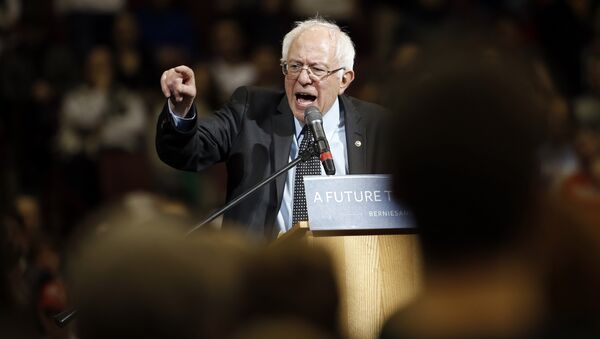According to Politico, the brouhaha started at the Nevada convention. A large group of Sanders supporters loudly claimed that candidate Hillary Clinton's backers had subverted party rules and treated candidates unfairly. They followed up their accusations by shouting at pro-Clinton speakers, and sent threatening messages to state party Chairwoman Roberta Lange, after posting her phone number and address on social media.
Democratic National Committee chair Debbie Wasserman-Schultz, along with other prominent party members, including Nevada Democratic Party Chairwoman Roberta Lange, who claimed that she was "stalked" by Sanders supporters by phone, demanded an apology and a condemnation of the violence from Senator Sanders.
Sanders subsequently released a statement, condemning all forms of violence, while noting that his campaign was threatened months ago when shots were fired into his campaign office and a housing complex for his campaign staff "was broken into and ransacked."
"If the Democratic Party is to be successful in November, it is imperative that all state parties treat our campaign supporters with fairness and the respect that they have earned," he said.
Wasserman-Schultz was not satisfied with his response, noting that a condemnation of violence should not include any "buts."
"With all due respect, when there is a ‘but' in between condemnation of violence generally, and after the word ‘but' you go on to seemingly justify the reason that the violence and intimidation has occurred, then that falls short of making sure that going forward this kind of conduct doesn't occur in the future," she said, calling Sanders's response "nothing but acceptable."
Jeff Weaver, Sanders's campaign manager, has accused Wasserman-Schultz of undermining the Sanders campaign from the beginning, calling her leadership into question.
"It's been pretty clear almost from the get-go that she has been working against Bernie Sanders — I mean, there's no doubt about it — for personal reasons," he said. "Debbie Wasserman-Schultz has really been a divider and not really provided the kind of leadership that the Democratic Party needs."
Democratic party members reiterate that they will unite over a winning candidate. Weaver said that Sanders will support the nominee, doing whatever he can to prevent a Donald Trump presidency.
The Sanders's campaign urges people in other states not to take what happened in Nevada as a rule. "Let's not confuse what went on in Nevada with some kind of broader issue," said Weaver. Sanders' campaign manager was unexpectedly supported by Clinton press secretary Brian Fallon, who credited Sanders for condemning the violence and encouraged people not to read too much into what happened in Nevada.
"This was really the exception, not the rule. So we don't think it's a harbinger for Philadelphia," he said.
The event prompted the latest round of speculation that Sanders supporters may disrupt the party convention, echoing the August, 1968 riots in Chicago. There, the Youth International Party ("Yippies"), Students for a Democratic Society, and other groups associated with 1960's counterculture protested following the Democratic Party's nomination of pro-Vietnam War presidential hopeful George McGovern over anti-war candidate Eugene McCarthy despite 80 percent of party primary voters having backed anti-war candidates including Robert Kennedy, who had been assassinated earlier that summer.
The protests turned violent, and 10,000 demonstrators clashed with 11,900 Chicago police, 7,500 Army troops, 7,500 Illinois National Guardsmen and 1,000 Secret Service agents over 5 days. Despite widespread police brutality, most Americans believed that Chicago mayor Richard Daley had responded appropriately.





